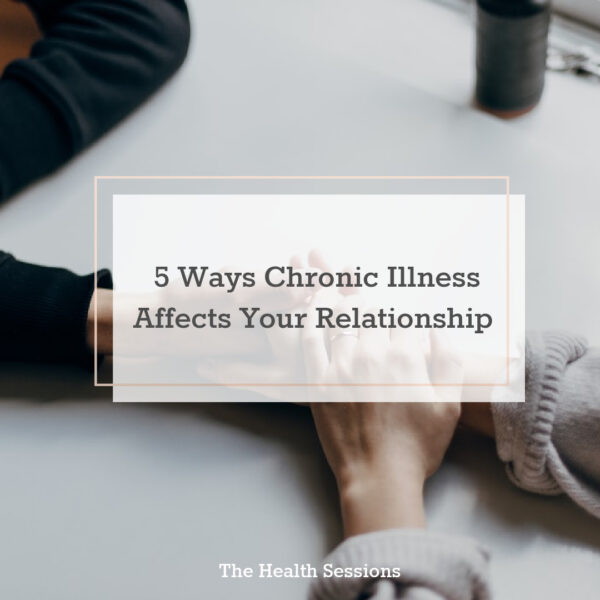The Fundamentals of The Health Sessions

This article is written by Miranda Davis.
Studies show a chronic illness affects patients and their partners. Apart from relationship dynamics, chronic illness changes the participants’ personalities. This is especially true if a chronic illness occurred midway into the relationship.
Even if your partner was already battling a chronic illness when you met, seeing the love of your life in pain is heartbreaking. Here’s how chronic illness affects relationships.
Apart from expressing love and reducing stress, sex builds trust and strengthens your bond. If you have a chronic illness, intimacy offers comfort by restoring normalcy to your life. But a chronic illness could hinder sexual function and enjoyment. The pain arising from some conditions makes it impossible to have sex.
Likewise, some treatments affect libido. And let’s not forget the connection between chronic illness and mental health. First off, the disease’s impact on your body could lower your self-esteem. What’s more, you may feel anxious about your sexual ability.
The good news is that intimacy is achievable outside the bedroom. You can explore other forms of physical contact like kisses, cuddles, massages, holding hands, and playing with each other’s hair. You could also take adventures or organize indoor date nights. You can cook, order takeout, listen to music, watch movies, or redecorate your house.
Another option is taking a couple’s class, for example, acting, languages, and art. The same applies to small gestures like smiling at your partner and making them laugh. Kindness is also essential to a partner battling a chronic illness. This involves politeness, compliments, and saying, “I love you” regularly.

Apart from the disease, the partner with a chronic illness is also contending with negative emotions. They might even be battling serious conditions like PTSD. But how can chronic illness cause PTSD?
Unlike assault and wars that have external triggers, medical trauma mostly stems from within. Aside from feeling like a burden, individuals with a chronic illness are afraid of what the future holds for them and their loved ones. That’s why you should be mindful of your sick partner’s feelings during arguments.
By stepping into the shoes of the partner with a chronic illness, you judge them less because you understand their actions. Assuming/For example? your spouse doesn’t want to go with you to the hospital. Most people would think, “My partner doesn’t love me, and this chronic illness is ruining our relationship.” However, your spouse could be protecting you from seeing them at their weakest.
Introspection might also help you handle conflict with a lover battling a chronic illness. Because you can control your emotions, you eliminate the barriers that arise during sensitive conversations. Supposing your normal reaction is keeping quiet or walking away when you anticipate an argument, self-knowledge lets you express yourself despite being angry, so your partner gets your point of view.
When finding love and conducting best dating sites review, individuals rarely picture a chronic illness in their future. However, nobody is immune to a chronic illness. Planning is an essential component of chronic illness and romantic relationships.
Having a disease doesn’t mean you should shelve your dreams. Rather, it’s an opportunity to review them. On top of giving you purpose, redefining your goals identifies progress and makes you hopeful. Although goals are unique to each individual, several tips can help you rearrange your priorities to suit a partner battling a chronic illness.
To begin with, acknowledge you cannot control particular situations. You may not be able to go to work immediately, but you can accelerate recovery as a couple by sleeping early to rest better. Additionally, don’t compare your situations to when a chronic illness wasn’t part of your lives. This way, you set realistic goals and increase your success rate.
Think of plans as to-do lists. Unlike goals, to-do lists are less intimidating. You can write these lists with your partner daily, weekly, or monthly, and check off accomplished tasks. Most importantly, consider the sick partner’s health. If they’re too exhausted to perform particular duties, the goals can wait.

A chronic illness makes it difficult to perform normal duties by causing pain, weakness, and fatigue. This reduces the household’s income, particularly when the sick partner is the breadwinner.
The soaring medical bills don’t help the situation; talk about doctor’s appointments, drugs, therapy sessions, even surgeries. You may also perform chores singlehandedly to aid the recovery of the partner with a chronic illness.
When it comes to finances, you could work extra hours or get another job to foot the bills. Similarly, reduce your spending to keep up with the new health demands. Instead of cooking separate meals for the partner with a chronic illness, you can save by cooking one healthy meal for the whole family. But don’t sideline the partner with a chronic illness.
Everyone wants to feel useful despite their health conditions. For instance, the partner with a chronic illness can wash the dishes or help the children with their homework. Another option is performing duties together. That way, you bond and complete tasks faster. If their condition allows, the partner with a chronic illness can even return to the office or work remotely.
You might be wondering how chronic illness affects family relationships and the individual. Since relatives offer physical, mental, and emotional wellbeing, a chronic illness impacts the entire family.
Friends and family should learn about the condition, so they understand their loved one’s pain. If the partner with a chronic illness cannot make it to social functions, attend on their behalf and tell them how everyone is doing.
You can also invite relatives to your place, so the spouse with a chronic illness doesn’t miss out. You don’t have to wait for special occasions like Christmas to meet relatives. You can arrange monthly family lunches and bond over a meal. Everyone, including the partner with a chronic illness, should participate in making the food. Some people can cook while others go grocery shopping and set the table.
Away from family meals, relatives can stay with your kids as you go to the hospital or drive the partner with a chronic illness to the hospital for check-ups. If they cannot make it physically, friends and family can call to protect the person with a chronic illness from loneliness. A chronic illness with no family support and neglect from friends can be tough on the patient.

Don’t stop your romance on account of a chronic illness. For starters, communicate more, respecting your partner’s views, and expressing yourself. You can also consult a chronic illness wellness coach for unresolvable issues. Is your partner battling a chronic illness? Share your experiences and tips for improving the relationship.
Author’s bio: Miranda Davis is a freelance writer in the relation and psychology area. Miranda is interested in such topics as building healthy relationships between people, love/sex compatibility, and how to find the right balance in life in general. She is currently doing specific research on the topic. Miranda loves cooking and long-distance walking.
If you enjoyed reading this article, you might also like: